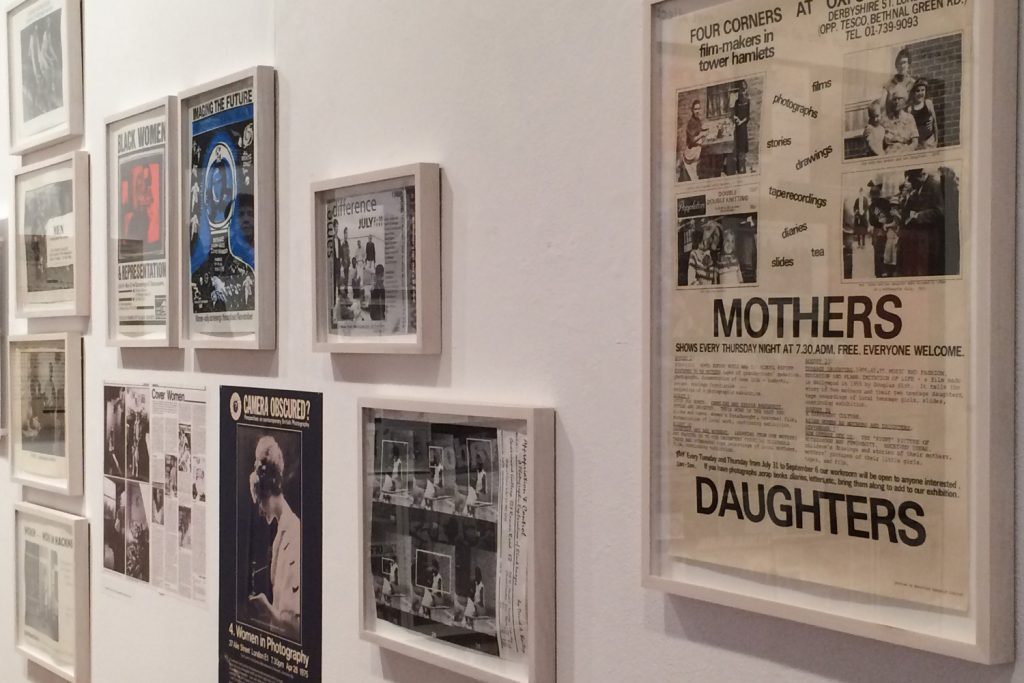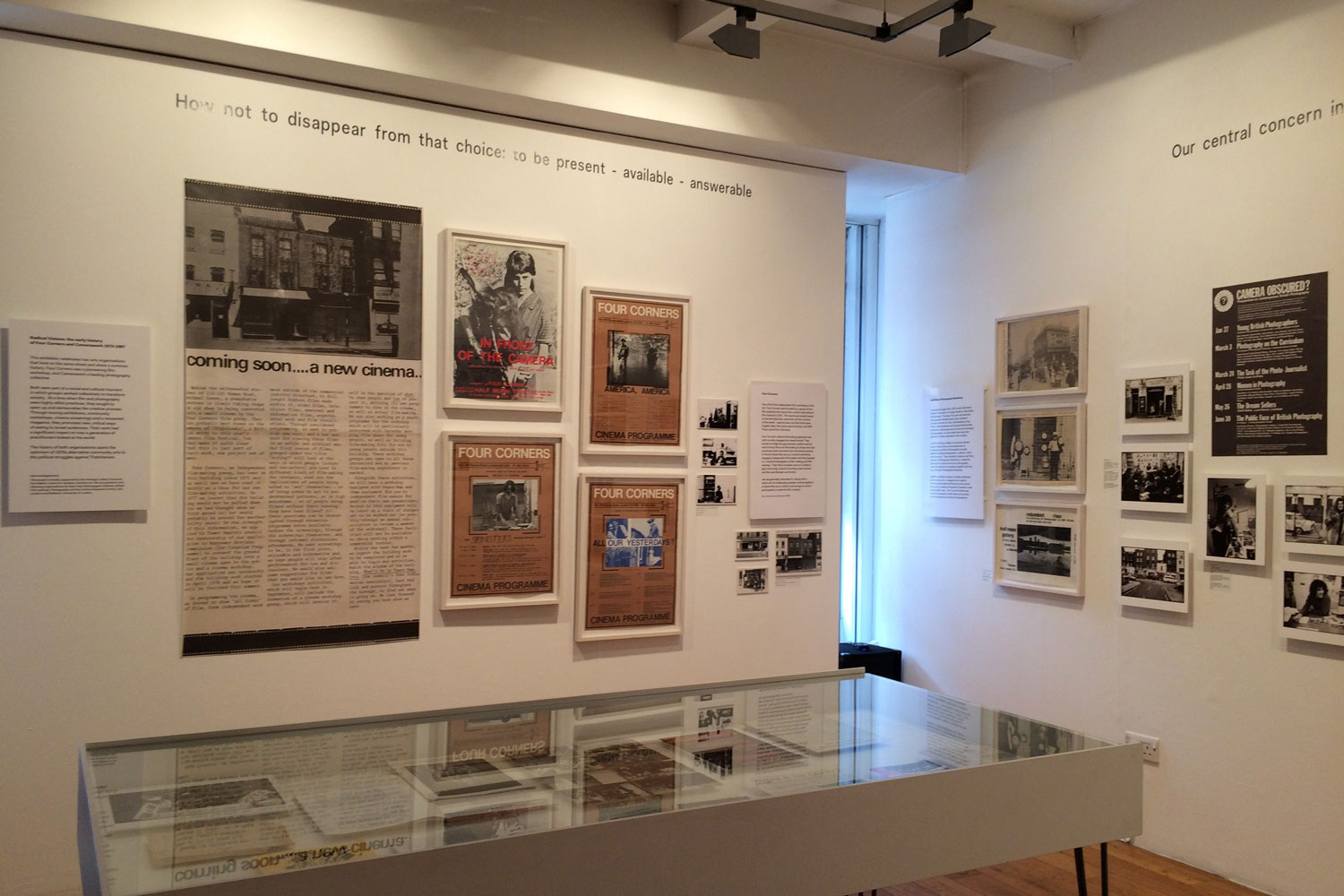Four Corners and Camerawork: Radical Visions exhibition and Modern Suffragette photography training
Film and photography centre and charity Four Corners has a long history of campaigning and community activism in East London. Its current exhibition, Radical Visions: Four Corners and Camerawork, and the future events focusing on photography for mothers, explore the role of radical photography in bringing about social change.
History of Four Corners Gallery
Four Corners have held their place on Roman Road for over 40 years, originally opening at 113 Roman Road in 1975. While this location was originally chosen for its inexpensive, main-street presence in 1970s London, a reason why so many artists made a home of the East End, Carla Mitchell stresses that it became the prime location for their work in campaigning and activism with East London being in the thick of the feminist, anti-racist, and anti-nuclear movements.
Gallery exhibition: Radical Visions

Their gallery exhibition ‘Radical Visions: The Early History of Four Corners and Camerawork’, looked back through time at how Four Corners and Camerawork, two separate organisations with common aims, were able to make an impression on the art scene in London, transforming the uses of film-making and photography to create powerful, positive change about local issues.
Four Corners started out as a small cinema and film workshop, founded by four students from all corners of the world in 1973. They focused on making positive change through their experimental and progressive films, some of which were financed and screened by early Channel 4.
Four Corners film-makers Mary Pat Leece and Joanna Davis produced the experimental documentary, ‘Bred and Born’ in 1983, which told of four generations of women, with interruptions from interviews about mother-daughter relationships.
This disjointed method was to convey how the feminist movement didn’t conform to the idea of women only being mothers, and instead intended on showing the idea as a broken narrative. The two film-makers also established a ‘Mothers and Daughters’ project in Bethnal Green which included film screenings, group discussions and performances for local mothers and young women.
The history of Camerawork magazine
Camerawork was a magazine created by Half Moon Photography Workshop in 1976, and 32 issues of which are now available to see within the Four Corners archive online. Half Moon Photography Workshop had similar aims to Four Corners, wanting to democratise photography and represent the unrepresented. Their project Women, held in the Half Moon Gallery in 1974, was one of the first all-women photography exhibitions.
Moreover, in the Late 1970s, Four Corners and Half Moon Photography Workshop used their location and photography for Anti-racist campaigns, aiming to capture the struggles of local Bangladesh immigrants who were being severely attacked in the area at the time. Four Corners and Camerawork were informed about local events and were able to convey, through exhibitions and the magazine Camerawork which circulated the London Art world, the real impact and reality of the struggles in East London.
These exhibitions often toured locally and then went further; a famous example is an exhibition that toured in Brick Lane in 1977, with artwork from Paul Trevor, after a particularly fierce demonstration against the National Front.
Empowering the East End community
Carla Mitchell, Development Director for Four Corners centre for Film and Photography, stressed that exhibitions always had their share of locals: ‘It was very important to include the locals, [Four Corners] was particularly interested in bridging the gap between the locals and the art world.. trying to prevent photography becoming an ‘elite practice’, [they] had a main aim of trying to democratise photography.’
Photography and film wasn’t like it seems today; with the right smartphone and access to the internet, it sometimes feels as though anyone can become a photographer. However, back in 1970s Roman Road, the equipment was expensive and inaccessible, locals had to be encouraged to immerse themselves in an art world that seemed an enterprise so separate from their own lives.
Of photography today, Carla Mitchell commented that despite the ‘overflow’ of photography in circulation, with Instagram and social media, she believes ‘it’s good, in the sense, the visual sense, that everyone is so used to looking at images, they can see more of the world and make sense of what they see… yet with the overflow of images all the time, thinking about why they were taken and what for, can be slightly more difficult… It’s very difficult and important that photography is showing the real thing.’ Four Corners focus on not whether something is art but rather what it was taken for, the very purpose and social context being delivered through the creative process.
Four Corners is still looking to place photography in the hands of those who are under-represented and have limited access to training. Their events focus on making the creative process attainable for all, and they have an event coming up that draws its inspiration from the Bred and Born and Women projects.
The Modern Suffragette: Free photography training for women
On the 17th October, a free open day event for ‘The Modern Suffragette’, will take place at Four Corners on Roman Road. ‘The Modern Suffragette’ is a photography project that offers free training and workshops for mothers. The workshops that will run from November – December 2018, also offer opportunities to use darkroom printing techniques rather than digital, so that they can experience the techniques of the 1970s.
When asked why the focus was specifically on mothers for this photography project, Carla Mitchell replied: ‘We were thinking, if Norah Smyth and Sylvia Pankhurst were alive today, what would they do? What would their steps be?’
Norah Smyth was part of a Suffragette breakaway group in East London that focused on campaigning for better rights for working women, specifically those with children, demanding changes like equal pay in addition to the vote. She was responsible for a lot of the photography in The Woman’s Dreadnought, the newspaper of the East London Federation of Suffragettes, using her photography skills to help with the campaigns.
The Four Corners ‘Modern Suffragette’ event is part of the Women’s Hall project celebrating the East London Federation of Suffragettes.
For more information and to register your interest in the event visit our event page for the Modern Suffragette.


